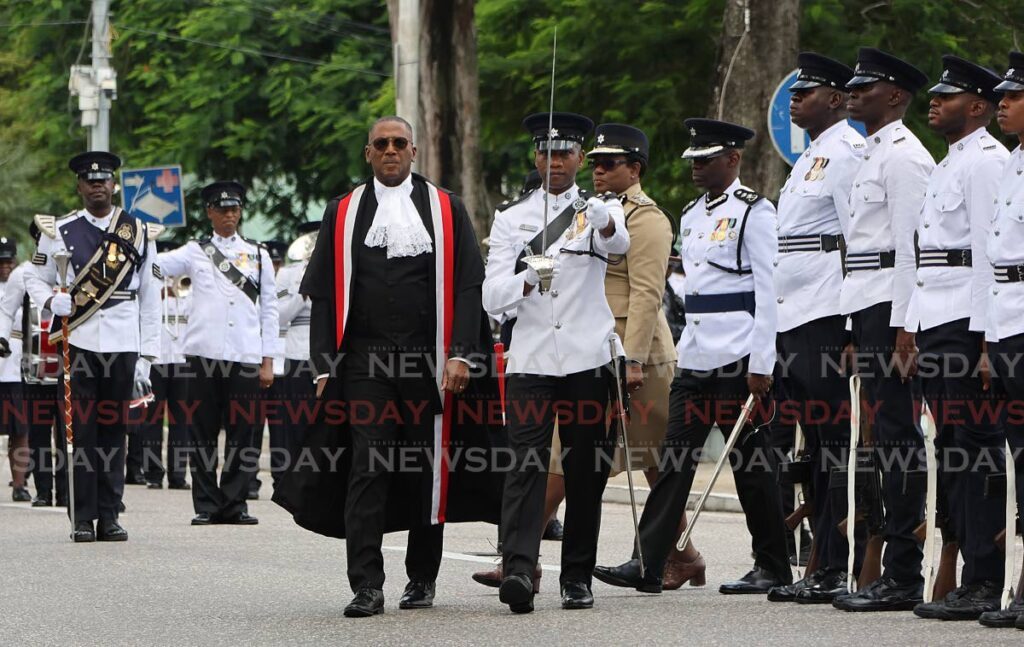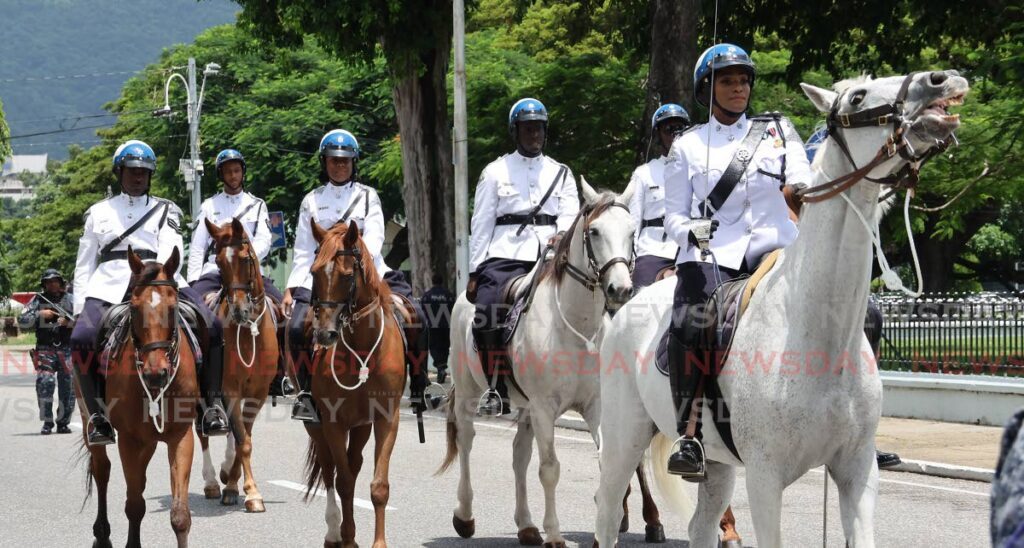Chief Justice talks staffing, salary impasse at law term opening

CHIEF Justice Ivor Archie is not ruling out heading to the Privy Council to settle an impasse between the Judiciary and the Salaries Review Commission (SRC) over some of its judicial officers.
“Judicial officers have rights, too, just like every other citizen,” Archie said at the ceremonial opening of the 2024/2015 law term on September 20.
For a second time, the opening was held at the National Academy for the Performing Arts (NAPA), Port of Spain.
There was a low turnout of the legal fraternity, with many empty seats in the Lord Kitchener Auditorium. There was also a noticeably less than full complement of 60 judges present. Outspoken judges Carol Gobin and Frank Seepersad opted not to attend and instead presided over their cases in Port of Spain and Tobago respectively.
At the 2023-24 opening, Archie spoke of the need for administrative independence for the Judiciary and meaningful public-sector reform, as the existing system, with its structural and systemic deficiencies, was “crushing us all.”
A year later, he said not much had changed. He warned of the possibility of “shutting down” the court because of inadequate specialised staffing.
“Last year, I pointed out all the challenges we face and apparently ruffled some feathers, so it now appears that we have been selected for special treatment.” He disclosed the issue with the SRC, which Archie said was “now attempting to reduce the salaries of masters.” This, he said, was after the Judiciary recommended increases for 93 per cent of officers under its purview. Archie said masters’ salaries were fixed by the Parliament.
“They tell me they have senior counsel’s advice that what Parliament did was unconstitutional. More fundamentally, this was done without any prior discussion or attempt at justification.
“They also claim that judges’ salaries, which they recommended as being appropriate in 2011, should not be increased over a decade later, despite the effect of inflation and two salary increases for public servants in the interim.
“What if a public agency takes the position that it does not have to obey the law passed by Parliament because a lawyer thinks it may be unconstitutional? We in trouble.”
He said the Judiciary wrote to the SRC “pointing out the egregious blunders in their methodology and asked for a meeting.
“They said they would be in contact to arrange one, neglecting to mention the deadline imposed for their reconsideration of the 117th report has now passed. And I am still waiting.
“The last time I checked, all of us, including the SRC, must obey the law as long as it has not been invalidated by a court.
“Judicial officers have rights, too, just like every other citizen.”
He said “mature, respectful, good-faith discussion or litigation” are ways to recognise those rights.
“Obviously, we prefer the former, but we have to be prepared for either. It would be sad indeed, you know, if we have to go to the Privy Council. That would be a shame.”

But he also promised, “I am going to keep giving this speech until somebody listens and does something.
“Maybe now that we are talking about constitutional reform, we have a perfect opportunity to look at all our institutions and public structures.
“As a country, we must determine whether the work of the Judiciary is important to us or not, whether we are going to give it the attention, understanding and appreciation that it deserves.”
Archie said the “biggest mistake we can make is to believe that the Judiciary is merely about judges and some space while ignoring the important role of administration, staff, systems and technologies in the delivery of justice.”
In his hour-long address, Archie also complained that the Judiciary’s ability to attract and retain talent was “adversely affected by inadequate terms and conditions determined by the Chief Personnel Officer (CPO).”
“These terms do not take into consideration the peculiar nature and scope of the work done by the Judiciary.
“Last year, I spoke about the inadequate terms offered by the CPO for certain jobs and the insistence on micro-managing an organisation that is not understood.
“We are still in the same place.”
The CJ said while there were not adequate terms for some positions, others were downgraded.
“We are trying to recruit and retain staff who are agonised by the fact that they want to work with the Judiciary, because the work is rewarding, but they are being poached by statutory bodies and state agencies, and even ministries, who are permitted to offer them more competitive salaries, and often for less work.
“Despite all of this, we are persevering.”
Earlier in his address, Archie said the Judiciary was not a political entity.
“And the Judiciary will neither be represented on certain public platforms, nor is it able to give voice and opinion to every aspect of national discourse.
“We engage and communicate, but we will not do so provocatively or adopt tactics to win public affection.
“By nature, the judiciary must position itself to remain impartial and neutral, so that when issues of public outcry appear before us on our dockets and in our courtrooms, we can interpret and apply the law without fear or fear of affection or ill will.”
But, he added, “That said, there are some things that I must address.”
One was what the Judiciary was doing with “all of this money they get.”
“First, let me say this. To begin with, it’s not that much money.”
He said in the last fiscal year, the Judiciary received 1.07 per cent of the national budget. This, he said, was not an “expensive Judiciary at all.” Eighty-eight per cent of that has been released by the Ministry of Finance and 98 per cent has been spent, he said.
He also lamented the complaints about delays in the Judiciary.
“People presume that somehow it is because the people in the Judiciary…Judges, need to work harder…Nothing is further from the truth.”
Archie said TT had the largest caseload in the region, despite not being the most populous jurisdiction.
“The judges and staff of the Judiciary work hard and long.”
Approvals for staff have failed to materialise and there is a high turnover, he added.
Archie mentioned two Cabinet notes on the rationalisation of jobs and remuneration. He said the first note related to a policy of the CPO and removing the Judiciary from it “may work for the Executive, but it does not work for the Judiciary.” He said legal advice has since been sought on the issue. He lamented that simple policy decisions were “taking two years…
“Not just the Judiciary, the country has a serious problem with the way things are run.
“This is not about pointing fingers.”
He said the second note also affected the Judiciary’s ability to staff its courts. After a decision in 2006, to roll out the family court in various districts, he said, the Judiciary was forced to pull staff and asked them to double up on their workload. He said he was now faced with the possibility of shutting down the Princes Town Family Court, with the impending court in Arima expected to suffer a similar fate for the same reason.
Archie also gave a brief account of ongoing refurbishment works at several court locations and provided statistics in some of the divisions,
At Friday’s ceremony, Anglican Bishop Claude Berkley gave the sermon at the service which preceded the CJ’s address. His sermon was based on the Book of Judges and judgment.
After Archie delivered his address and adjourned court for the day, the Defence Force paraded around Memorial Park, ending in front of NAPA, where he inspected the troops and took the salute.

Comments
"Chief Justice talks staffing, salary impasse at law term opening"